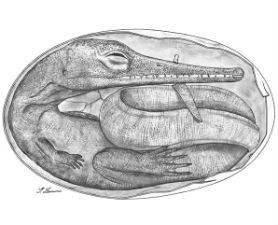
Aquatic reptiles that pre-dated the dinosaurs gave birth to live young and may have been good parents.
In a study published in the current issue of
Historical Biology: An International Journal of Paleobiology, scientists look at the fossil records of a species of aquatic reptile known as the mesosaur, which lived around 280 million years ago on the supercontinent Pangaea, which later split into the land masses that include South America and South Africa.
The fossils include retained embryos, suggesting the animals gave bith to live young rather than laying eggs as dinosaurs did. This is often associated with greater levels of parental care being given to the young, something the fossil record also supports, because mesosaurs of various ages were all found together.
From NBC News:
Mesosaurs, and even their earlier ancestors, possibly "were not able to produce hard-shelled eggs, at least for the first several million years of their evolution," lead author Graciela Piñeiro, a paleontologist at Uruguay's Facultad de Ciencias, told Discovery News. "After the recent discovery of mesosaur embryos, we can state with a high degree of confidence that embryo retention developed early in amniote evolution, given that mesosaurs are among the basal-most reptiles and that they date from the Early Permian around 280 million years ago."
Piñeiro and colleagues Jorge Ferigolo, Melitta Meneghel and Michel Laurin recently discovered the exceptionally well-preserved mesosaur embryos at sites in Uruguay and Brazil. The environmental conditions at the locations allowed for the preservation of soft tissues, nerves and blood vessels, she said.
Read the full story
here.
Image: Graciela Piñeiro/NBC News




To prevent automated Bots from commentspamming, please enter the string you see in the image below in the appropriate input box. Your comment will only be submitted if the strings match. Please ensure that your browser supports and accepts cookies, or your comment cannot be verified correctly.